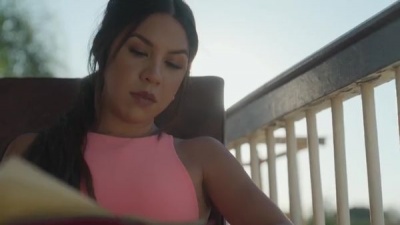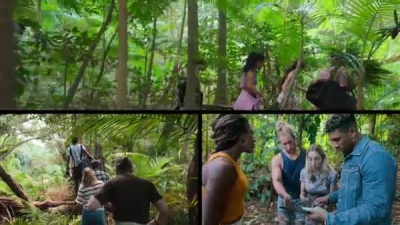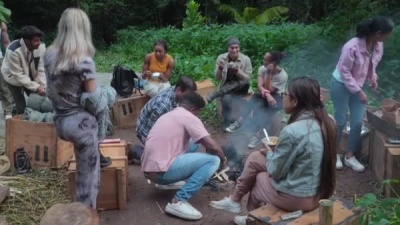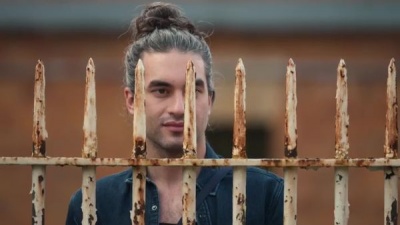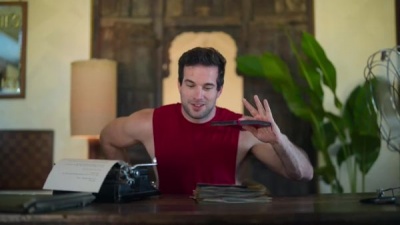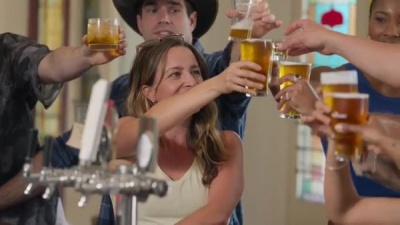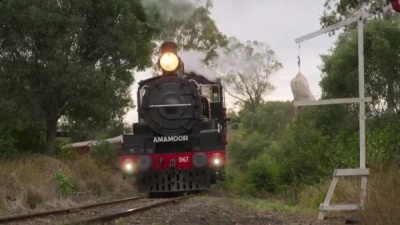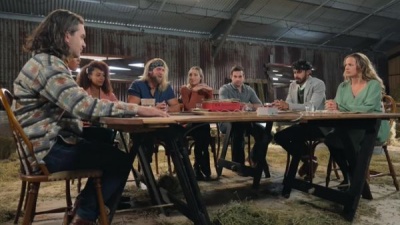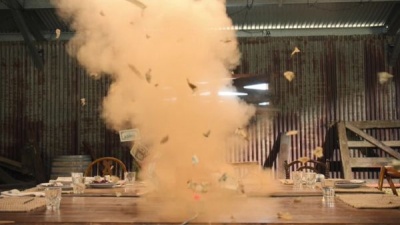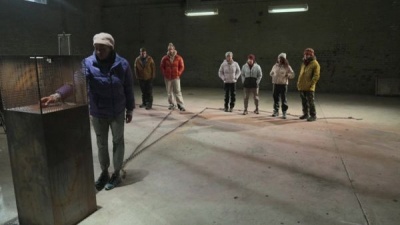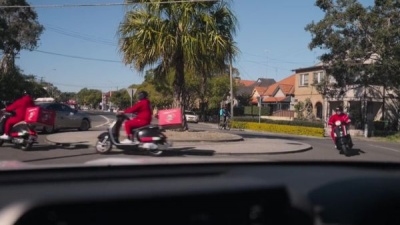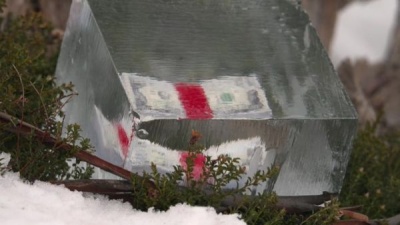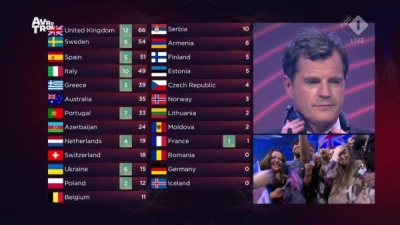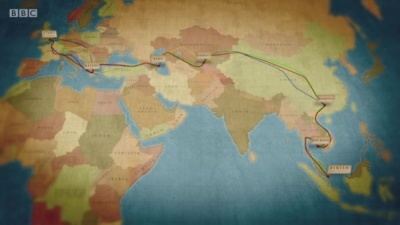Weaver's Week 2022-11-27
Last week | Weaver's Week Index | Next week
This week, who is trying to undermine the format from within? It's time to review
Contents |
The Mole
Eureka Productions for Netflix, 7-21 October
With a warning that – inevitably – this review will contain spoilers. We're not going to say who the mole is, or who the winner is, but some of the discussion and pictures will give away key plot points. If you want to come in fresh, skip ahead now to the BBC Brain recap.
Some readers will never have seen The Mole before. A team of players are set missions to win money. One of the team is a mole, who is working to sabotage the missions and reduce the pot. From time to time, there will be a test, and whoever knows least about the mole will be eliminated; the mole never goes.
At the end of the series, there's a final test, and the winner of that test earns all the money built up in the pot. In this series, it'll turn out to be US$101,500 (then £75,000, € 94.000, about 2.5 years' average wages).
When done well, The Mole makes for gripping and compelling television. Although it was edited into ten episodes, the publisher Netflix chose to release the first five at the same time, a 3¾-hour megasode when watched back-to-back. Three episodes were released a week later, and the final two held for another week. Does the publisher not want people to watch the programme and speculate as to who the mole might be? That is how The Mole gathered an audience on Dutch-language television and on our Channel 5, good old word of mouth.
The series begins with episode one. As it's establishing the basic premise, the introduction is long, it's explained crisply, and never feels like it's dragging. Later episodes will assume that you're familiar with the basic concept of the show, which is reasonable as there aren't going to be viewers joining halfway through.
Contestant introductions are done one-by-one, as they arrive at an abandoned plane in the Australian jungle. Again, it's a good choice – it feels natural to see someone walk up, introduce themself, and learn more about them from a piece-to-camera.
There are a lot of pieces to camera in this series. All of the action is summed up by contestants in the past tense. We did this, and I did that, and she did the other. I felt such, and I'm sure that Billy is the mole because there's a Y in the day.
So many calls of "you're the mole" in pieces to camera. And so much repetition in these pieces to camera. Someone will say something in the jungle, and literally the next thing we see is them saying the exact same thing in a piece to camera.
The first episode has a main challenge – retrieve some lost cases containing cash, bring them back to the plane, and guard them overnight. There's a side challenge, some nasty person has nicked one of the cases; that person knows the money is the case will be doubled if their case is not found. We've no problem with a secret mission, but on the first episode? Too soon, let us get to know the players a little better first. They've got to form the team before they break the team.
And the episode ends, after one-and-a-half challenges, with a test. The person scoring worst on the test will be eliminated from the show at once – can't even say goodbye. The reveal is done through mobile phones – they give off a green glow, light up the players' face with a coloured shade. We get to see the result and the reaction in one shot, which is very cool.
Except... we don't get to see the first elimination, that's held behind a cliffhanger until episode two. Or, if you're watching on the publisher's preferred method, straight away. The cliffhanger only works if there's time between each episode, and the publisher didn't honour that cliffhanger. Do they not know how to publish good television?
Edited out of the show here: a two-week COVID break, players were mostly kept in their hotel rooms, and only allowed to go for walks with one other player. Bit like The Circle, except without any challenges, and no voice-operated comms system.
The show eventually resumes with Opdracht: Celbreuk (Mission: Cellbreak. The Mole is a Dutch-language format, and this version has been translated into most world languages – except Dutch.)
To break out of the cell, teams of three need to work together to find one key, then another, then the last, and get out. On its own, this would be a compelling challenge. It's made more complicated for the viewer with twist after twist after twist. Double the money and take ten minutes off the clock! Buy a clue! Buy five minutes for each remaining team! The money goes up and down like a boat bobbing on the water.
In the next episode, there's a big physical challenge to retrieve diving equipment and use it to raise treasure chests to the surface. Part of the equipment is a buoyancy aid, which needs to be inflated by an air cylinder. Although they're not heavy, one of the team finds that these cylinders do not float. We wonder if he's related to the contestant on ITV's Survivor who thought that a machete would float.
There's also a challenge where players can either look at dossiers on their fellow contestants, or bid for an exemption using money from the pot. There were bids put in, and someone won. The cliffhanger for this episode is – who put in the top bid? That's really not a good use of a cliffhanger. The subsequent test en executie is still mostly about the mole's biography, handing an advantage to those who used the dossiers.
"Right now, the mole is winning", as someone always says around here. Right now, a third of the way through the episode, we get the opening credits. Have they pilfered ideas from The Burkiss Way to Dynamic Living, a Radio 4 comedy show that played its opening credits halfway through, and sometimes after the closing credits? Cheques in the post to Simon Brett of Stepney, please.
Incredibly, we're up to episode four, and a couple of the contestants still haven't been given a plotline. One of them gets a plotline in Opdracht: Terugkopen, refusing to help a contestant regain his place in the game. Who is this player, has she been with us all along?
And why was this not the cliffhanger for the episode? Set up the elimination, reveal it's conditional, start along the challenge to buy back the place in the game, and then, "I'm not playing." Is this bad production, bad editing, or bad molling?
And the show continues. Contestants still give the most inane pieces to camera. "Either it's an honest mistake, or she's sabotaging the mission". Yeah, that covers most possibilities. Either she's doing it deliberately, or she's doing it incompetently. Or she's doing it properly and you're too thick to see it, but that's most unlikely.
The next episode has Opdracht: Treinen, Auto's en Hardlopen. One team's on a train. We said, ONE TEAM'S ON A TRAIN. Another has to run 11km, and a third has a long drive through the dusty outback on barely-there roads. Each has three packets to pick up, and only the packets on the platform when the train arrives in 90 minutes' time will count.
Bad production lets down a promising challenge. There's some really bad dubbing of the opening explanation from host Alex Wagner – we can easily tell the difference between what she said at the time and what's been grafted on in post-production. And it's clear that they've ignored a complication to get the packets out of the mailboxes, presuming that that's too difficult for the Netflix audience to follow. We don't take kindly to being patronised by the producers.
Later, Opdracht: Ontploffend Eten, a meal that really will go with a bang. Two contestants are sitting on triggers for a bomb. Borrowing an idea from Trapped, the producers feed the poor unfortunates with spicy peas, with cider and vinegar "wine", and with a pavlova made from chili. The first proper cliffhanger of the series: whether one contestant takes an exemption to the next episode, or takes the money for the pot.
After the contestant's decided, the explosion goes off. It's meant to go off with a satisfying kaboom, but it barely even registers a ploff.
The second half of the series continues with more bad dubbing, and lots of guesswork. There's a nod to Interceptor, as some contestants have backpacks containing money, others have backpacks weighted to a similar amount, but The Mole is too dull to even mention this. What should be a death-defying challenge – walk across a precipitous drop on a few ropes – somehow manages to be banal.
Opdracht: Kettingbende is an egregiously poor piece of television. The contestants are chained together in what we're told is a cold warehouse. How do we know it's cold? Because the host Alex Wagner said so. They could have filmed "cold" shots – they could have brought up blue colours, used dark lighting, frosted breath, icicles. But no, they use the same stagnant palette and murky shots as every other part of the show. This really isn't good enough, children's show Escape from Scorpion Island had better and more meaningful art direction, and that was back in the aughts.
One of the players grabs the key to free themselves, and has the option to take an exemption to the next episode. One of the players takes the exemption. We would expect to see an "over the shoulder" shot when this happened, looking at the contestants' faces. We want a close up of the contestants' faces! A close up, you jerks! A close up!!!
We get a distant shot of the contestant taking the exemption. And apparently that passes muster as a cliffhanger, because then we're into episode seven, and such is the quality of this episode that it's seven minutes shorter than the earlier ones.
Two truths and a lie – two of the players have remarkable experiences, one spends the evening in their hotel bar. Who told the truth? It's five minutes of listening to other people telling us about the fun they had (or didn't have), and in quite dull detail. It later emerged that the producers had chopped a middle part of this challenge to sort out which of the players would spend the evening in, because they would get an exemption if their fable was convincing. Not only are we being patronised, we're not being told the full truth, and the programme suffers as a result.
And the show goes on. Wittering and accusations, bickering and badmouthing dominate the first half of the show. Have we turned into Newsuur by mistake? The challenge should be fun – two pairs have to follow their clue trail and rescue the fifth player – but it's again turned into something tremendously tedious by the production decisions. The show ends on another proper cliffhanger, albeit a very shallow one. Who leaves, is it the obvious mole or the one remaining candidate?
"I'm gonna get rid of a grand", says one player in the next game, literally dropping four blocks of money off the back of the sled. The challenge is to rescue blocks of ice containing money, and if any viewer was confused before now, they know who the mole is.
The final episode has a "spy" mission – retrieve canisters from webbing, and from a sucker room, and just by running in. It's somewhere between Raven and Fort Boyard, albeit filmed by people who had never seen a camera before. And, such is the quality of this final episode, it's barely two-thirds as long as the first five.
Why did we not enjoy The Mole on Netflix? It's not good television. For starters, it's unimaginative. Almost without exception, the challenges are all "go to location X, find item Y, bring it to location Z, all against the clock".
Where's the sheer inventiveness? One episode – one episode! – of Channel 5's series had contestants fencing, jetskiing, and doing lawn bowls, then asked them to spot another contestant who had put on prosthetic make up to look very different.
Channel 5's show let the action unfold naturally, with explanatory narration from host Glenn Hugill. He addressed the contestants, and he explained things to us. Alex Wagner is asked to explain things to the contestants, and we watch as she does that. Alex doesn't speak directly to the viewer, she only talks to the contestants. The only people who speak to the viewer are contestants, through their pieces to camera. Does that make The Mole hosted by all candidates with Alex as a co-host? Technically, yes.
If we're to believe the series, The Mole was challenge after challenge after challenge. There was no interaction between players outside the challenges. This is blatant nonsense, and the show needed to acknowledge that there was life outside work for the players. As we've seen, the cliffhangers added nothing to the show, and the two that were actually left for a week are amongst the most banal cliffhangers we've ever seen.
One last criticism: the music on the show is generic rubbish. They didn't go to the expense of having someone compose a coherent suite for the programme. They didn't go to the trouble of licensing loads of pop tracks to add familiarity and excitement to the show. Instead, it's generic off-label stuff that we would call Muzak except we know that Muzak is a) fierce to defend its trademark and b) better than that.
Are we impressed by The Mole? No. This column didn't expect Eureka Productions to do in one series what IQTV have built up over twenty years. We did expect them to display some basic levels of production, shot direction and audio balancing were not up to the standards we expect from professional television. We're never going to like the pieces-to-camera idea of narration, but this seems an exceptionally poor implementation of it.
Do we need to lower our expectations of Netflix even further? It's the second game show we've reviewed (after Bulls*it), and the second that hasn't impressed us. Maybe their forthcoming remake of Goncharov will convince us.
BBC Brain final
Radio's most prestigious general knowledge quiz reached its final this week. The BBC Brain will be found, crowned, and celebrated to the high heavens. And, even after 68 series across 69 years, new ground can be broken. This is the first time all the finalists have been women.
They're not here by chance: all won her heat, all won her semi-finals. Marianne Fairthorne, Mastermind champion in 2015, starts us off by knowing who is father of X Æ A-12 and Vivian Jenna Wilson. Emma Laslett, from Only Connect and Moneybags and Dan's Eurovision Streams, knows that Twitter's mascot was called Larry T Bird. Is he, we wonder, a brother of the Channel 4 Daily's big attraction Earl E?
Both Marianne and Emma start the show with the most prestigious and rare honour – five in a row and a bonus mark. It's a bit like 100 minutes in a big televised football match, they do seem to have a lot of it this week, but then it is the finals.
In the second round, Sarah Trevarthen picks up the fact that Thomas Shafernaker and Owain Wyn Evans are both weathermen, and she knows about members of The Pixies. Sarah was a finalist in this year's Mastermind, and a finalist in this year's Counterpoint music quiz. Marianne goes into the Beat the Brains interlude with a four-point lead over all other contenders.
But Marianne ducks on the first question in her next set, which means she won't score too many points. Sarah Trevarthen picks up that bonus, and Gradgrind's definition of a horse. Emma Laslett remembers Pokemon Go, which reminds us that we're still waiting for a decent game show inspired by it – or even a rubbish game show suitable for Netflix. With bonuses, Marianne's lead holds at four points.
And, to our surprise, Russell Howard announces this must be the final round. So many points have been scored, we only have time for four sets of questions. Marianne scores another three, surely putting the win beyond doubt. The fourth contender is Isabel Heward, winner of Mastermind in 2017, reached the grand final under both Fifteen-to-One hosts, and Film Buff of the Year. On this occasion, the questions don't fall her way until this round.
Both Emma and Sarah pick up a bonus from their fellow players' questions, and Emma knows the formal name for a "googol", 1 followed by a hundred zeros. Sarah gets another bonus on the 1990 movie Memphis Belle, and knows the penny-pinching habits of Jacob Rhys-Moog, Henry is a green engine, and the PSOE operates in Spain. That completes another five in a row and a bonus mark.
So, who wins? Isabel Heward 9, Emma Laslett 13, Marianne Fairthorne 16, Sarah Trevarthen 17! A marvellous come-from-behind victory, rightly praised by all who heard it. Sarah was interviewed on the BBC's magazine programme Women's Hour, and elsewhere in the media.
Regrettably, Women's Hour seemed to confuse BBC Brain with another show. They might be thinking of Blighty's Blingest Gonads, a show where bits and you-know-whats are put up for judgement.
BBC Brain is all about intellect, general knowledge, and swift recall of information. Things up there, not down there. It is a matter of deep regret that Women's Hour has chosen to sideline the matters that matter to women in quiz: stop sexual harassment, expand the quiz canon, make quiz diverse and welcoming.
Eurovision Song Contest news
The EBU has issued its response to the attempted jury nobbling in May's senior contest. The response? Throw the baby out with the bathwater. Juries will no longer give points in the semi-finals unless the televote fails completely (or it's the SMRTV jury, as San Marino has no televote). Qualifiers to Saturday will be decided 100% by the televote.
Will these changes alter the winner? Probably not: in the weekend final, the juries will still give their 50% of the points, the public will give 52%. Will the changes alter who qualifies? Almost certainly, some of the more obvious jury-catnip performances may not get through, replaced by some of the more boom-bang-a-crash entries.
We've all got our own opinions on whether the Saturday contest would benefit from more boom-bang-a-crash, or more highbrow artistic stuff. The EBU has made its decision, and they want the Saturday show to be a bit more of a spectacle. This column can see why the EBU has gone for a little more populism at the margins.
Our problem is with the conclusion that "juries are bad" based on one amateurish attempt to rig the contest. The EBU could have done many things. They could have increased the size of juries, or mandated that each broadcaster make two juries with a random draw deciding which would be used. They could have created a large international fan panel, weighted to match the demographics of actual ESC viewers and awarding lots of points to all of their top 20. Start the voting with The Fans' Little Wodge, go round the regions, end with the Televote Big Wodge.
And what happens when it becomes clear that the televote is very easy to rig? Hand out €20 SIM cards in a mid-sized territory, say "could you spend €2 to send ten votes for Pottsylvania", and the points are in the bag. Will the EBU's Big Brother come back in five years and go "We have always said that juries are good and televotes a necessary evil"? This feels like a knee-jerk reaction, although it's small enough not to change much, which might mean it's completely ineffective and hence a waste of everyone's time.
Another change has more merit. There will be an International Online Vote. It will be open only to voters with a credit card issued outside the competing territories, and the IOV will have the weight of precisely one territorial televote. Suddenly, the Eurovision Song Contest is open to anyone in the world. Even places that do not feel the love for the idea – Ottawa, Minneapolis, Cape Town, Bratislava... Online votes have been part of Junior Eurovision for about five years, and (touch wood!) seem to run quite well these days – the EBU know what they're doing.
In other news
Lauren Layfield and Hrvy will commentate on the Junior Eurovision Song Contest for the BBC. The interval act will feature both of AMPTV's superstars – Malena, whose "Qami qami" is the reason we're here; and Rosa Linn, whose "Snap" might be the biggest song not to win Senior Eurovision since "Volare".
Coming this Christmas: The Great Big Tiny Design Challenge on Channel 4. A festive episode of the show, hosted by Sandi Toksvig, it will feature minute decorations and a teeny-tiny Alpine cabin for Sandi to live in.
This week we learned:
- The Corby trouser press was invented by a man called Corby. It takes its name from its function, reminding you not to visit Corby. (Mastermind)
- In the book Mrs Frisby & the Rats of NIMH, Mrs. Frisby is a mouse. She starred on an Only Connect wall alongside Tag from 1950s children's show Rag, Tag, and Cottontail. Tag is not to be confused with Tag from Hey Duggee, who is a young rhinoceros.
- Three beaches still have full-time Punch & Judy performers – Swanage, Llandudno, and Weymouth. (Young question-setter Milo from House of Games)
- The Beaker People introduced the beaker to these islands. A selfish tribe, they were all me-me-me-me-me-me-me. (Young question-setter Raphael from House of Games)
Quizzy Mondays
Remember Gentleman Jack, the drama about the life of a Yorkshire gentlewoman? Alison Rose does, she took Anne Lister as her specialist subject, and won Mastermind with ease. Another contender took the play Dear Evan Hansen, and the round covered both events in the play and discussion of where and when it's been staged.
Only Connect is in its Winners' Round, and the Jillies beat the Morporkians. A low-scoring match opened with a question about how to lose in chess-boxing, the unlikely amalgam of two pastimes. London local government was a big scorer, and the Jillies were annoyed when they suggested that Twilight's hot-blooded werewolf Jacob Black is a vampire.
A magnificent University Challenge saw the points flying, buzzers blaring, and lots and lots of correct answers. When the dust had settled, Courtauld Institute of Art had beaten Newnham Cambridge by 175-160. Was the atmosphere made more welcoming by the presence of six women in the room? Quite possibly. Perhaps a bit too much vexilology on this week's show – a picture round on the flags of islands was quickly followed by a question about flags with eagles on them. Baz Luhrmann's Moulin Rouge! was referenced in OC and UC – originals of songs from the movie here, other songs by "Lady marmalade" performers earlier.
Who are The Traitors? Claudia Winkleman investigates on BBC1 (Tue-Thu). Portrait Artist of the Year reaches its final (Artsworld, Wed). Strictly Come Dancing moves to Friday this week. Next Saturday sees the return of Schedule A / Schedule B, so all we can promise is Love Actually on ITV2 – don't forget to miss it!
Pictures: Eureka Productions, BBC, Magnum Media, Over The Top Productions / Objective Productions, EBU/RAI/NOS/AVROTROS, Studio Lambert.
To have Weaver's Week emailed to you on publication day, receive our exclusive TV roundup of the game shows in the week ahead, and chat to other ukgameshows.com readers, sign up to our Google Group.



